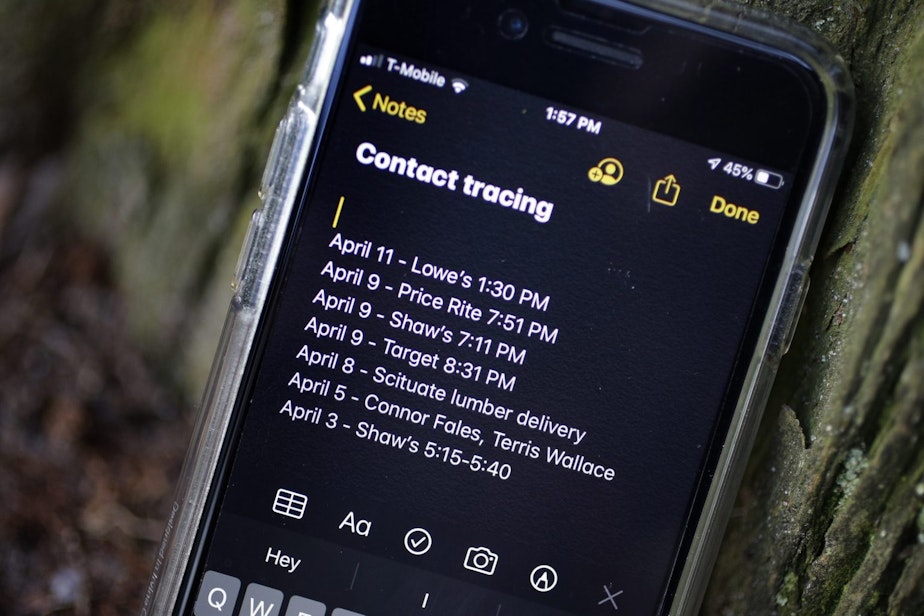Private firm could see $21 million for coronavirus contact tracing in Washington state

The Washington State Department of Health is entrusting a private company with the task of helping local health jurisdictions with Covid-19 case investigations and contact tracing. The business contract is worth up to $21 million.
The contract is one of many “special market condition” purchases and agreements the state has signed during the pandemic without requiring a competitive bidding process.
The data and policy firm Mathematica will begin training investigators next week, who will start performing case investigations and contact tracing the following week, said Mathematica project director Candace Miller. The firm is working with subcontractors, Comagine Health and Allegis.
With the current case count right now, the state is on track to spend closer to $9 million, said Cynthia Harry, director of the state Department of Health's informatics and surveillance office.
The money for the contract comes from the federal government, through the CARES Act or Centers for Disease Control and Prevention, she said. Should more people in the state get Covid-19, the state would scale up its case investigations and contact tracing, Harry said. The contract runs until February 2021.
State contracts generally require competitive bidding, but normal procurement rules have been waived under the current state of emergency.
The Department of Health awarded the contract to Mathematica from among seven organizations using a “modified competitive process,” according to spokesperson Jamie Nixon.
The contract doesn’t represent all case investigations and contact tracing in the state. Workers at local health departments, such as Public Health – Seattle & King County, will still perform much of that work and rely on the state as backup. Currently, the state helps around 11 counties investigate Covid-19, Harry said, though it changes daily.
The state health department plans to be able to conduct 30% of case investigations and contact tracing statewide, Harry said.
The company’s 200 contact tracers will work from home in counties across the state, and make an average of $20 an hour, Miller said. The company is looking to hire bilingual people to fill up to a quarter of the positions, focusing on Spanish, Chinese, Russian, Korean, and Marshallese.
The governor and state officials have repeatedly sought to reassure the public that it’s safe to disclose their personal information to public health workers over the phone as part of contact tracing.
While investigators will be working from home, Miller said the new employees will use the same web-based case investigation and contact tracing system the National Guard is using now, so there’s no downloading of data.
Potential employees will be asked to give the company a “virtual tour” of their work-from-home space so the company can ensure it’s conducive to confidentiality, Miller said.
“We at Mathematica have been working on federally funded and state-funded projects for over 50 years,” Miller said. “We implement data security training and processes, and quality assurance processes, to make sure that the most careful security and confidentiality of all information is protected at every step of the process.”
The new employees will replace close to 200 National Guard members who had been working as case investigators and contact tracers. As of August 21, the federal government asked Washington state to pay 25% of the cost of using the National Guard, according to a spokesperson for the Washington Military Department, Karina Shagren.
Other public health professionals had also been filling in as Covid-19 investigators. But Harry said they needed to get back to their “day jobs” inspecting food and water systems and responding to around 100 other infectious conditions, such as measles, salmonellosis and HIV.
“We needed to carve out a resource pool that was more sustainable longer term,” she said.
Effective case investigations and contact tracing interviews of Covid-positive people and their contacts can be a vital step in stopping disease transmission.
Metrics for case investigations and contact tracing are one measure that Governor Jay Inslee and other leaders consider when deciding whether it’s safe for counties and the state to move to a higher level of reopening.
However, a state dashboard that’s supposed to show that data has said “Coming soon…” for months.
The goal is for 90% of people who test positive with Covid-19 to be reached by a public health professional within 24 hours. The state aims for a public health professional to reach the Covid-positive person’s contacts within 48 hours.
Recently, contact tracing by the state health department on behalf of local jurisdictions is falling well behind targets, according to “preliminary” data provided by the department, which advises should not be considered “definitive or accurate.”
In the last week of July, 43% of people who tested positive with Covid-19 were interviewed within a day of the Department of Health receiving the test results, according to data provided by the department. Just over half of a person’s contacts were interviewed within two days of the department receiving the test results.
“Based on time and resource constraints, we are not yet able to fully validate the data pulls to ensure they are accurate and complete,” state Department of Health spokesperson Amy Reynolds wrote in an email.
The state has recently transitioned to a new data system based on a Microsoft platform, requiring “sizeable retraining” and delaying data reporting, Reynolds said.
That week the weekly average of new confirmed Covid-19 cases was around 700 or more a day.
Months ago, state officials were happy to announce good news about contact tracing data.
The proportion of people getting interviewed quickly after a positive test result was in the “high 80s” and even reached 90 percent in May, said Maria Courogen, the health department’s branch director of disease containment in a June 2 media telebriefing. The numbers represented contact tracing efforts across the state’s counties, as well as by state workers, she said.
At that point, the state had a weekly average of under 300 confirmed cases of Covid-19 a day.




